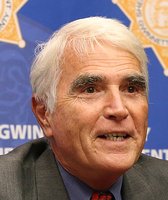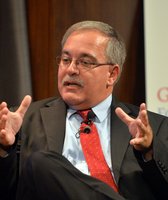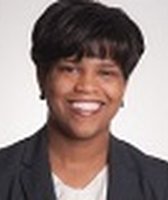Stand up for the facts!
Our only agenda is to publish the truth so you can be an informed participant in democracy.
We need your help.
I would like to contribute
Access to legal help an issue, justice says
In his first State of the Judiciary address, Chief Justice Hugh P. Thompson declared that all Georgians need access to justice, regardless of their economic backgrounds.
And in many cases, he said, that means they need the services of a lawyer.
Yet in Georgia, Thompson said, that's not as easy as it might seem.
He cited statistics showing:
- 70 percent of Georgia's lawyers work in five metro Atlanta counties.
- 62 of Georgia's 159 counties have 10 or fewer lawyers.
- six counties are lawyerless.
Too few lawyers? What about the so-called "lawyer glut?" In the interest of truth (and justice), we decided to do some checking.
Jane Hansen, spokeswoman for the Georgia Supreme Court, said the chief justice's comments were based, in part, on a report by the State Bar of Georgia titled "Lawyer Distribution in Georgia."
The report showed the state with 28,883 active lawyers in 2011, including 20,027 or 69.3 percent, working in Clayton, Cobb, DeKalb, Fulton and Gwinnett counties in metro Atlanta.
The State Bar research revealed that there are no lawyers in six rural counties - Baker, Chattahoochee, Clay, Echols, Glasscock and Webster. In three of those counties, Baker, Clay and Echols, at least 30 percent of residents live in poverty, according to U.S. Census data.
Follow-up research in August 2013 showed the number of lawyers in the state had grown to 29,973. But none of them had established a practice in those six lawyerless counties, said Michael L. Monahan, an attorney and pro bono director for the State Bar.
The findings came directly from the State Bar’s membership data, Monahan said. In Georgia, membership in the State Bar is mandatory for all lawyers.
In his address to a joint session of the state Senate and House of Representatives, Thompson recalled the promise of "liberty and justice for all" in the Pledge of Allegiance.
Featured Fact-check
"I don’t believe we ever meant ‘liberty and justice only for those who can afford it,’ " he said. "... As Georgia continues to grow in population and diversity, access to justice is a challenge requiring the commitment and hard work of us all."
Thompson told lawmakers that many attorneys and two groups -- the Atlanta Volunteer Lawyers Foundation and the State Bar of Georgia -- have stepped up to offer their services at no cost to the poor.
"But these voluntary efforts do not fill the gap," he said.
Thompson cited a report from the Supreme Court’s Committee on Civil Justice in 2008 that showed only 9 percent of low-income Georgians with a legal need were able to get help from a lawyer.
He also pointed out that two nonprofit law firms, the Georgia Legal Services Program and the Atlanta Legal Aid Society, provide civil legal services to the poor. But both firms have been hard hit financially since the start of the recession in 2007, Thompson said.
Phyllis Holmen, the executive director of Georgia Legal Services, said her budget is back up slightly this year but had been cut $2 million since 2008. That meant that the agency had to freeze positions and lay off staff, including 23 of the 75 lawyers who work in 154 counties, Holmen said.
Judges, Thompson said, have been reporting that more people are coming into court trying to represent themselves. That creates fairness issues, particularly in family law cases where the opposing party has an attorney, Holmen said.
Monahan said the State Bar is looking to address a difficult problem. "The fix is not going to be easy," he said. "The market decides where people work."
Thompson said other states are also experiencing a void of lawyers outside their major cities. In South Dakota, where 65 percent of attorneys practice in five cities, the chief justice has warned that the large populated areas of his state are becoming "islands of justice in a rural sea of justice denied," Thompson said.
"Georgia’s lack of legal services in rural areas is every bit as severe as South Dakota’s, if not more so," he told lawmakers. "We must take steps to correct the imbalance."
So where does this leave us?
Thompson said, "Six of Georgia’s counties have no lawyers at all." Credible data from the State Bar of Georgia and other information, including anecdotal evidence from local judges, support his statement.
We rate it True.
Our Sources
Emails with Jane Hansen, spokeswoman, Georgia Supreme Court, starting Feb. 3, 2014.
State Bar of Georgia, "Lawyer Distribution Report in Georgia" 2011.
Phone and email interviews with Michael L. Monahan, attorney and pro bono director, State Bar of Georgia, beginning Feb. 4, 2014.
Phone interview with Phyllis Holmen, executive director, Georgia Legal Services Program, Feb. 4, 2014.
Georgia Legal Aid court-based help centers in Georgia information.
Browse the Truth-O-Meter
More by Nancy Badertscher
Access to legal help an issue, justice says
Support independent fact-checking.
Become a member!
In a world of wild talk and fake news, help us stand up for the facts.




























































